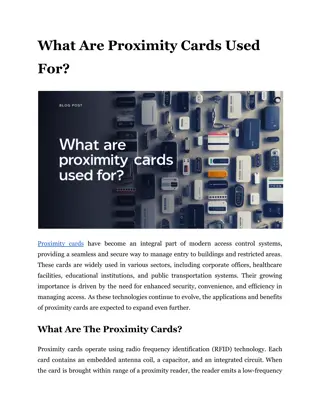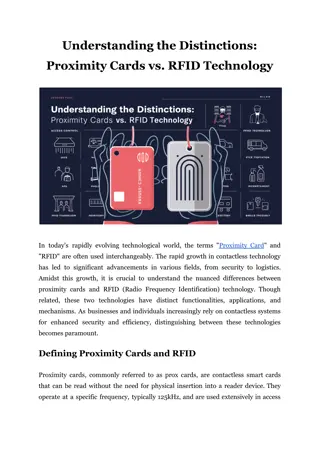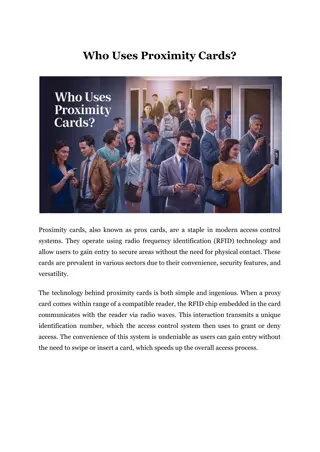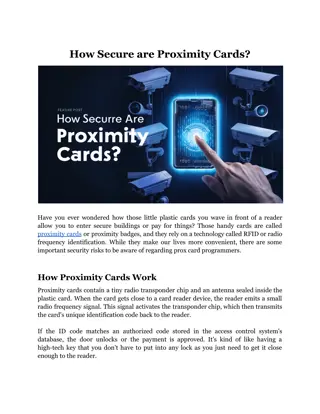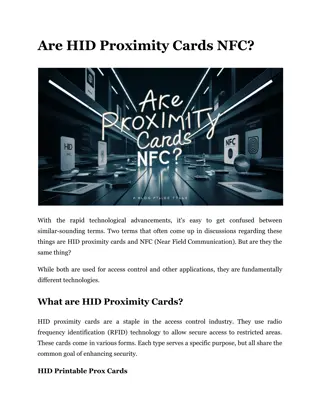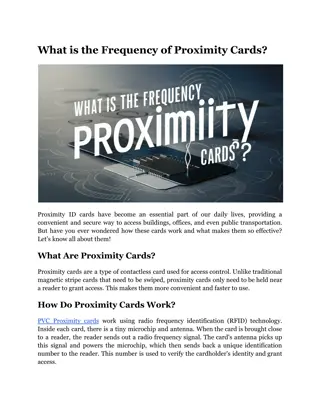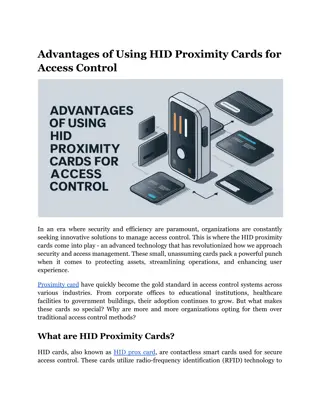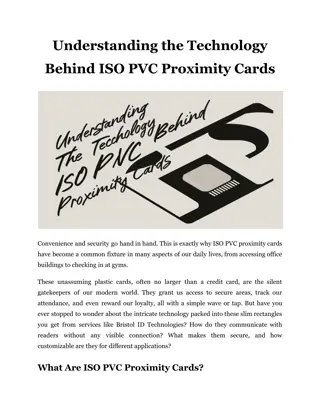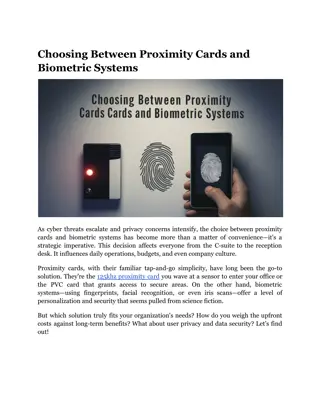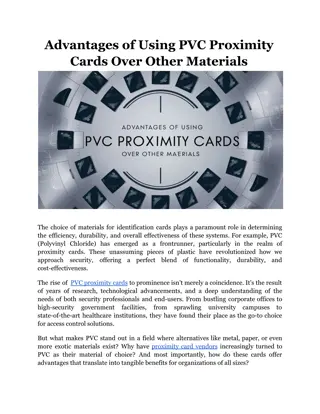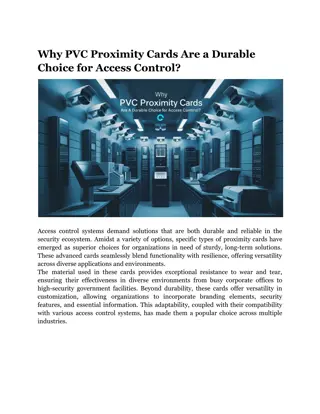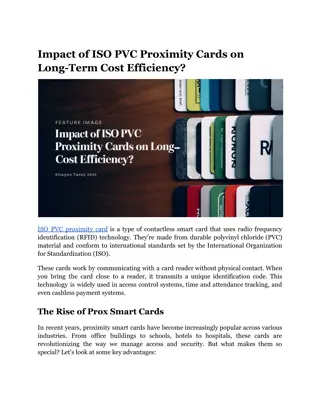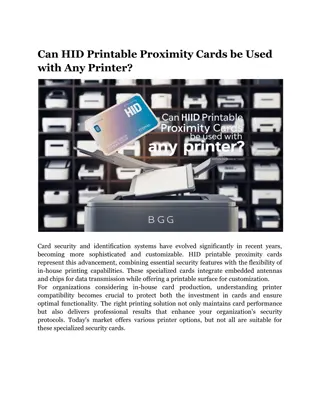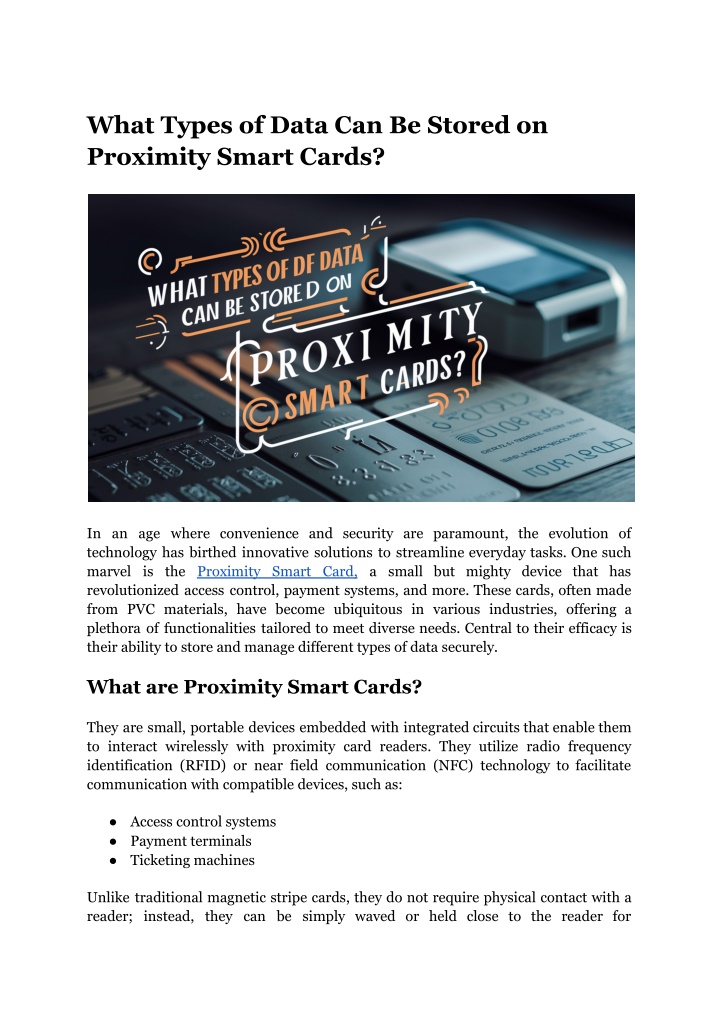
What Types of Data Can Be Stored on Proximity Smart Cards_ What Types of Data Can Be Stored on Proximity Smart Cards
Unsure what data proximity cards hold? Explore common types of information stored on these contactless cards and their security features.
Download Presentation

Please find below an Image/Link to download the presentation.
The content on the website is provided AS IS for your information and personal use only. It may not be sold, licensed, or shared on other websites without obtaining consent from the author. If you encounter any issues during the download, it is possible that the publisher has removed the file from their server.
You are allowed to download the files provided on this website for personal or commercial use, subject to the condition that they are used lawfully. All files are the property of their respective owners.
The content on the website is provided AS IS for your information and personal use only. It may not be sold, licensed, or shared on other websites without obtaining consent from the author.
E N D
Presentation Transcript
What Types of Data Can Be Stored on Proximity Smart Cards? In an age where convenience and security are paramount, the evolution of technology has birthed innovative solutions to streamline everyday tasks. One such marvel is the Proximity Smart Card, a small but mighty device that has revolutionized access control, payment systems, and more. These cards, often made from PVC materials, have become ubiquitous in various industries, offering a plethora of functionalities tailored to meet diverse needs. Central to their efficacy is their ability to store and manage different types of data securely. What are Proximity Smart Cards? They are small, portable devices embedded with integrated circuits that enable them to interact wirelessly with proximity card readers. They utilize radio frequency identification (RFID) or near field communication (NFC) technology to facilitate communication with compatible devices, such as: Access control systems Payment terminals Ticketing machines Unlike traditional magnetic stripe cards, they do not require physical contact with a reader; instead, they can be simply waved or held close to the reader for
authentication or transaction purposes. They are typically made from durable materials like PVC and are designed to withstand daily wear and tear. They offer a secure and convenient means of storing and transmitting data, making them ideal for a wide range of applications, including transportation and healthcare. Thus, they have become ubiquitous in modern society, offering users a seamless and efficient way to access facilities, make payments, and participate in various services and activities. With their versatility and reliability, these cards continue to play an increasingly vital role in enhancing convenience, security, and efficiency across diverse industries and sectors. Read More Articles: Why IT Support in Toronto is a Crucially Indispensable Business Service Types of Data Stores on Proximity Smart Cards 1. Identification Data: At its core, they serve as a means of identification. Whether used for employee access control or student attendance tracking, they store essential identification data such as names, ID numbers, and photographs. This information facilitates seamless authentication processes, which allows individuals to gain authorized access to specific areas or services efficiently. 2. Access Control Data: They excel in access control applications, acting as gatekeepers to restricted areas. Embedded with access control data, they enable authorized personnel to enter secure premises while keeping unauthorized individuals at bay. Access control data may include access levels, permissions, and time-based restrictions, ensuring that only those with the requisite authorization can enter designated areas. 3. Financial Data: The integration of financial data capabilities into Proximity Cards has transformed them into versatile payment tools. They can securely store financial data such as account balances, transaction histories, and encrypted payment credentials, regardless of whether they are used for cashless transactions in corporate cafeterias or as prepaid cards for public transportation. With a simple tap or swipe, users can make swift and secure payments, which eliminates the need for cumbersome cash transactions. 4. Healthcare Data: In the realm of healthcare, these cards have emerged as indispensable tools for managing patient information and enhancing medical services. They can store vital
healthcare data, including medical histories, allergies, prescription details, and emergency contacts. By consolidating this information into a portable and secure format, healthcare professionals can access critical patient data promptly, enabling informed decision-making and personalized care delivery. 5. Transportation Data: They play a pivotal role in modern transportation systems, which offer commuters a convenient alternative to traditional transportation data, these cards store travel credits, journey histories, and fare information. Additionally, they streamline the commuting experience, reducing queues and enhancing passenger flow efficiency. ticketing methods. Equipped with 6. Membership Data: Organizations and institutions often utilize them to manage membership privileges and benefits effectively. Membership data stored on these cards may include membership levels, renewal dates, and access to exclusive amenities or events. From gym memberships to club affiliations, these cards simplify membership management processes, enabling seamless access to member-only services and facilities. Read More Articles: Audubon's Birds of America A Visual Symphony: The Timeless Beauty of 7. Event Ticketing Data: They have revolutionized the way events are managed and attended, offering a convenient alternative to traditional paper tickets. Event ticketing data stored on these cards includes event details, seating assignments, and ticket validation codes. By leveraging these cards, event organizers can enhance entry processes, mitigate ticket fraud, and enhance the overall attendee experience. 8. Asset Tracking Data: In industrial and corporate settings, they are instrumental in asset tracking and management. Further, they can store asset identification data, maintenance schedules, and usage logs, enabling organizations to monitor the whereabouts and condition of valuable assets. Conclusion The capabilities of Proximity Smart Cards extend far beyond mere identification. From access control and financial transactions to healthcare management and event ticketing, they serve as versatile repositories for a wide array of data types. As technology continues to advance, the scope of their applications is poised to expand
further, ushering in a new era of convenience, security, and efficiency across various industries and domains. To get the best PVC Proximity Cards, you may rely on our products and servcies at Bristol ID Technologies! Site Article: What Types of Data Can Be Stored on Proximity Smart Cards? What Types of Data Can Be Stored on Proximity Smart Cards




